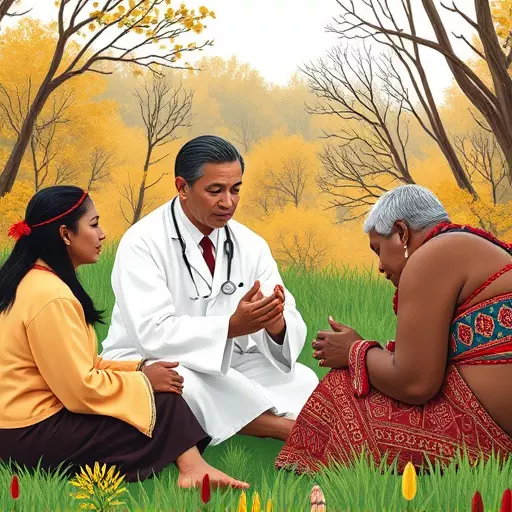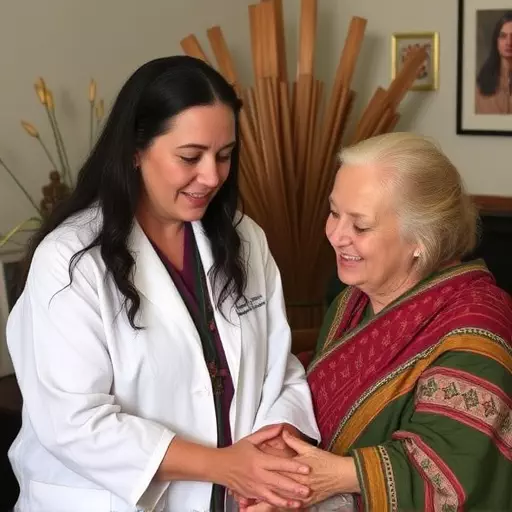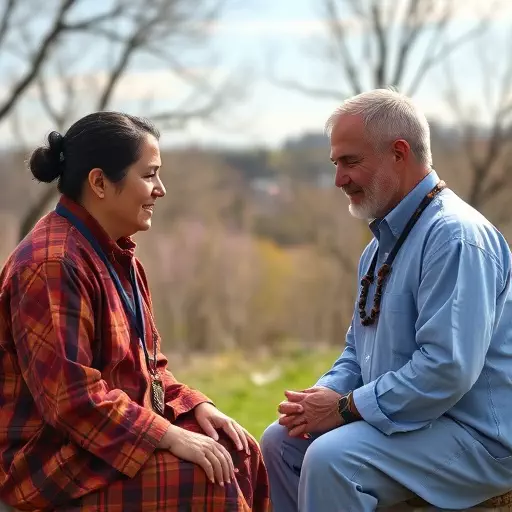In Bloomington-Bedford, integrative medicine combines ancient healing rituals from diverse cultures with modern medical practices. This approach respects individual holistic health, addressing mind, body, and spirit. By integrating traditional methods like acupuncture, herbal remedies, and mindfulness, healthcare providers cater to varied cultural backgrounds and personal beliefs, fostering trust and improving health outcomes. This adaptive strategy ensures patient-centered care tailored to unique needs while leveraging both ancient wisdom and scientific advancements.
In today’s diverse healthcare landscape, integrating traditional healing rituals into patient-centered care is gaining traction. Bloomington-Bedford serves as a growing hub for this innovative approach, with practitioners embracing integrative medicine. This article explores how combining ancient traditions with modern practices enhances wellness, especially in understanding cultural connections. We delve into the benefits of adapting patient-centered care to individual needs while navigating and respecting diverse cultural healing rituals. Through case studies, we demonstrate successful integration, highlighting the growing significance of this holistic approach in healthcare.
- Understanding Integrative Medicine: A Growing Approach in Bloomington-Bedford
- Traditional Healing Rituals: Unlocking Cultural Connections to Wellness
- Patient-Centered Care: Adapting Modern Medicine to Individual Needs
- The Benefits of Combining Ancient and Modern Healing Practices
- Navigating Cultural Differences: Respecting and Integrating Diverse Traditions
- Case Studies: Successful Integration of Traditional Healing in Clinical Settings
Understanding Integrative Medicine: A Growing Approach in Bloomington-Bedford

In Bloomington-Bedford, there’s a growing trend towards integrative medicine, where traditional healing practices are seamlessly integrated into modern patient care. This approach recognizes that diverse therapeutic methods can work in harmony to address patients’ holistic needs—mind, body, and spirit. By incorporating ancient wisdom with evidence-based contemporary treatments, healthcare providers cater to the unique cultural backgrounds and personal preferences of their patients.
For instance, integrative medicine in Bloomington-Bedford might involve traditional healing rituals such as acupuncture, herbal remedies, or mindfulness practices alongside conventional medical interventions. This adaptability allows for a more patient-centered care approach that respects individual beliefs and customs, fostering trust and improving overall health outcomes. Understanding and embracing these cultural differences is key to the success of integrative medicine in this community.
Traditional Healing Rituals: Unlocking Cultural Connections to Wellness

In the realm of healthcare, particularly within the context of integrative medicine in Bloomington-Bedford, there’s a growing recognition and embrace of traditional healing rituals as integral components of patient-centered care. These ancient practices, deeply rooted in various cultural traditions, offer more than just spiritual or symbolic benefits; they unlock a unique connection to wellness that has been passed down through generations. By integrating these rituals into modern medical care, healthcare providers are not only respecting but also enhancing the overall well-being of their patients.
When traditional healing practices are incorporated into integrative medicine, it allows for a more nuanced understanding of cultural differences and their impact on health and healing. This approach recognizes that every patient comes from a diverse background with unique beliefs and traditions that can significantly influence their healthcare needs and preferences. Adaptability is key; how integrative medicine adapts to these cultural nuances ensures that the care provided not only treats the physical symptoms but also respects and nourishes the spiritual and emotional aspects of each individual, fostering a holistic healing environment.
Patient-Centered Care: Adapting Modern Medicine to Individual Needs

Patient-Centered Care is a revolutionary approach in modern medicine that places the individual patient at the heart of their healthcare journey, empowering them to take an active role in decisions about their treatment. This method moves away from a one-size-fits-all model, recognizing and respecting each person’s unique cultural background, beliefs, and preferences. By embracing this philosophy, healthcare providers in Bloomington-Bedford and beyond can foster a more inclusive environment, especially when integrating traditional healing practices into modern care.
In the context of integrative medicine, understanding and incorporating traditional healing rituals from diverse cultures can significantly enhance patient outcomes. This approach not only adapts to cultural differences but also respects and values the wisdom passed down through generations. For example, certain communities may rely on herbal remedies or specific meditation techniques for well-being, which can be incorporated into a holistic treatment plan alongside conventional medicine. Such integration ensures that patients receive comprehensive care that considers their entire lifestyle, beliefs, and emotional needs.
The Benefits of Combining Ancient and Modern Healing Practices

Integrating traditional healing rituals into patient-centered care offers a multitude of benefits for both patients and healthcare providers. In Bloomington-Bedford, practices in integrative medicine are blossoming by incorporating ancient methods into modern treatments, resulting in more holistic and culturally sensitive care. This approach recognizes that different cultures have unique beliefs and practices around health and wellness, and adapting modern medicine to accommodate these differences can lead to improved patient satisfaction and outcomes.
By combining traditional healing practices with conventional medical treatments, healthcare providers create a more comprehensive and personalized care plan. This integration allows for the preservation of cultural heritage while leveraging the latest scientific advancements. For example, some patients may prefer acupuncture or herbal remedies as part of their treatment regimen, which can be seamlessly incorporated into their overall care strategy. Such an approach not only respects individual preferences but also empowers patients to take a more active role in managing their health.
Navigating Cultural Differences: Respecting and Integrating Diverse Traditions

In an increasingly diverse healthcare landscape, especially in areas like Bloomington-Bedford, where various cultural traditions coexist, it’s crucial for integrative medicine to adapt and embrace these differences. Integrative care aims to respect and incorporate traditional healing practices into modern medical approaches. This involves a deep understanding of patients’ cultural backgrounds and their inherent beliefs about health and wellness. By navigating cultural divides, healthcare providers can offer more personalized and patient-centered care, ensuring that individuals receive treatments aligned with their values and customs.
When integrating traditional healing rituals, it’s essential to foster open communication and educate both patients and medical professionals. This process allows for the recognition of diverse therapeutic methods, from herbal remedies to ritualistic ceremonies, as valid components of holistic healthcare. As integrative medicine in Bloomington-Bedford evolves, it can create a harmonious blend of ancient wisdom and modern science, catering to a broad spectrum of patients with varied cultural backgrounds.
Case Studies: Successful Integration of Traditional Healing in Clinical Settings

In recent years, there has been a growing interest in integrating traditional healing rituals and practices into patient-centered care models, particularly within the context of integrative medicine in Bloomington-Bedford. Successful case studies have demonstrated that incorporating cultural elements from diverse communities can significantly enhance therapeutic outcomes. For example, some healthcare providers have incorporated traditional healing practices such as acupuncture, herbal remedies, and mindfulness techniques originally from East Asian cultures. These practices have been adapted to fit modern medical settings, allowing patients from these backgrounds to receive holistic care that respects their cultural beliefs and traditions.
The ability of integrative medicine to adapt to cultural differences is a key factor in its success. By embracing traditional healing methods, healthcare professionals can create more inclusive environments that foster trust and encourage active participation from diverse patient populations. This approach not only improves patient satisfaction but also leads to better adherence to treatment plans, as patients feel more connected to their care. As a result, integrating traditional healing practices into modern medical care has the potential to revolutionize healthcare delivery, ensuring that it is truly patient-centered and responsive to the unique needs of every individual.
